Australia Imposes Sanctions On Iran For Human Rights Violations
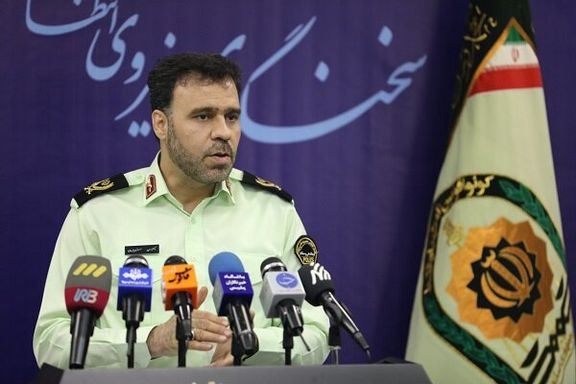
On the occasion of the first anniversary of the death of Mahsa Amini, the Australian government has taken action to further sanction Iran for its human rights abuses.

On the occasion of the first anniversary of the death of Mahsa Amini, the Australian government has taken action to further sanction Iran for its human rights abuses.
It is the first time targeted financial sanctions and travel bans have been put in place on regime figures under the recently expanded Iran autonomous sanctions framework.
The sanctions, designed to address the ongoing oppression faced by Iranians, especially women and girls, will target four individuals and three entities directly involved in systemic rights abuses.
Among the sanctioned individuals is Saeed Montazerolmahdi, the spokesperson for Iran's Law Enforcement Forces, who has repeatedly used intimidating and threatening language towards Iranian women and girls alleged to have violated Iran's mandatory veiling laws.
The targeted entities include Iran's Cyber Police, which plays a central role in stifling freedom of expression by restricting internet activity in Iran. Additionally, Press TV, the state-backed TV channel, has come under scrutiny for broadcasting forced confessions of Iranians and dual-nationals who face politically motivated judicial procedures.
Australia also reiterated its commitment to taking measured and effective action against those responsible for egregious human rights violations in Iran.
The Australian government further called upon the Iranian regime to hold accountable those responsible for the death of Mahsa Amini, one year on, nobody still held accountable for her murder in morality police custody.
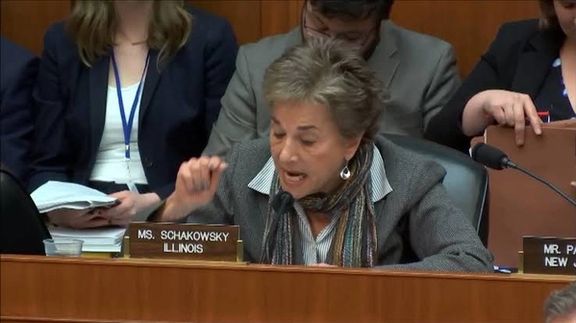
The Baha’i community of the United States has issued a condemnation of the ongoing persecution faced by the minority group in Iran.
In a statement released on Tuesday, the community expressed its concern and anguish over the relentless oppression of the group of roughly 300,000 by the regime.
The focal point of the community's announcement is the unanimous passage of House Resolution 492 by the United States House of Representatives.
The crucial resolution, entitled Condemning the Government of Iran's State-Sponsored Persecution of the Baha’i Minority and Its Continued Violation of the International Covenants on Human Rights, was introduced by Congresswoman Jan Schakowsky [D-IL], supported by a bipartisan group of 28 cosponsors.
House Resolution 492 chronicles the sustained and egregious abuses suffered by the community in Iran since 1979, providing an irrefutable record of their persecution. The resolution emphatically calls on the regime of Iran to immediately cease its persecution of the Baha’is and denounces its continued violation of the Universal Declaration of Human Rights and the International Covenant on Civil and Political Rights.
The community's statement also reveals alarming statistics about the recent surge in persecution, beginning in June last year. During this period, over 300 incidents of raids, arrests, arraignments, sentencings, property confiscations, and denials of higher education have been documented. The pattern of oppression continues unabated, with nearly 60 Baha’is arrested or imprisoned, 26 receiving sentences or jail terms, and 59 Baha’i-owned properties forcibly sealed by authorities.
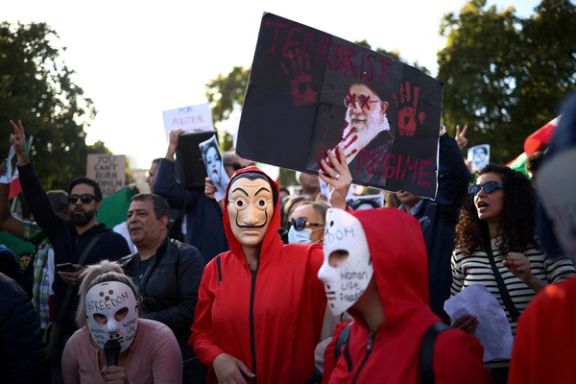
Like other prominent Iranian dissidents, Hamed Esmaeilion of Canada is urging the West to “stop appeasing the Islamic Republic” and “not hinder” the anti-regime movement.
In a note published Monday on his Instagram account ahead of last year’s nationwide protests anniversary on September 16, Esmaeilion accused the regime of simultaneously continuing its “hostage-taking policy” and “obeisance to China and Russia” to force the West into deals with the Islamic Republic.
Esmaeilion also said he would join other Iranians in Toronto, Canada, on September 16 “to chant “Woman, Life, Freedom”, the signature slogan of the movement that was sparked by the death of 22-year-old Mahsa Amini in the custody of morality police. “I know that sooner or later the Iranian people will topple the Islamic Republic.”
“We will neither forgive nor forget,” Esmaeilion, a dentist-writer who turned into a fierce activist when he lost his wife and young daughter in the downing of a commercial flight over Tehran in January 2020 by the Revolutionary Guards (IRGC), wrote.
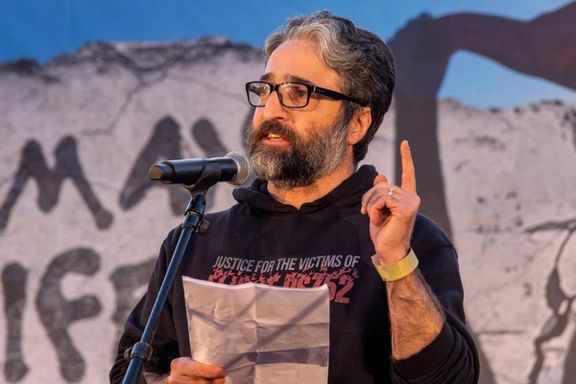
Expatriate Iranian have been planning anniversary demonstrations in several major world cities on Saturday some of which, including in Montreal, Canada, will be held outside US embassies and consulates.
A small group of Iranians staged a rally Monday outside the US Consulate in Toronto to protest what they allege is US government and Canadian “appeasement of the Islamic Republic.”
They were referring to the Biden administration’s decision to unfreeze $6b of the Islamic Republic’s frozen assets in South Korea and “encouraging hostage diplomacy by paying ransom” as well as demanding the US to impose maximum pressure on the regime.
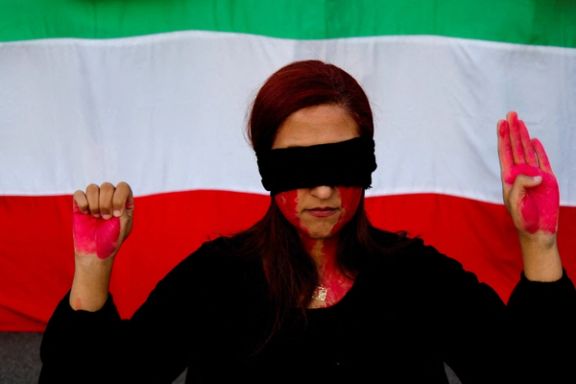
On Monday, the US Congress was informed that Secretary of State Antony Blinken has signed a waiver to allow international banks to transfer $6 billion of Iran’s frozen assets in a hostage release deal with Tehran. The State Department says Blinken determined that waiving the sanctions was in the national security interests of the United States.
Both Washington and Tehran since announcing the prisoner swap deal in August had claimed that the prisoner swap deal and the unblocking of the frozen funds were unrelated, but the waiver clearly links the two as one agreement.
"Allowing these funds to be transferred from restricted Iranian accounts held in the (Republic of Korea) to accounts in Qatar for humanitarian trade is necessary to facilitate the release of these US citizens," a US document seen by Reuters on Monday said.
The deal involves the release of five American citizens held in Iran and five Iranians held in the US. American lawmakers have been harshly criticizing the Biden administration for what they say is effective paying a huge ransom, which will only encourage the Iranian regime and endanger more Americans.
Other Iranian figures including exiled Prince Reza Pahlavi and activist Masih Alinejad have on many occasions in the past few years criticized the West for “appeasing the terrorist regime”.
In a Wall Street Journal opinion piece in August last year, the former crown prince said the way Western powers interacted with the Islamic Republic had emboldened it to continue its repressive measures against Iranians with greater immunity.
“Iranian people are not asking the Western countries to save them, they are asking the West to stop saving the Islamic Republic,” Alinejad said in a speech at Italy’s Senate in February.
“The West has always shown weakness against the Islamic Republic’s hostage-taking strategy and still wants to continue appeasing this government,” Canada-based data scientist and activist Ali Ashtari told Iran International TV in February, demanding that Western politicians and expatriate Iranians who “surrender to such humiliation be disgraced.”
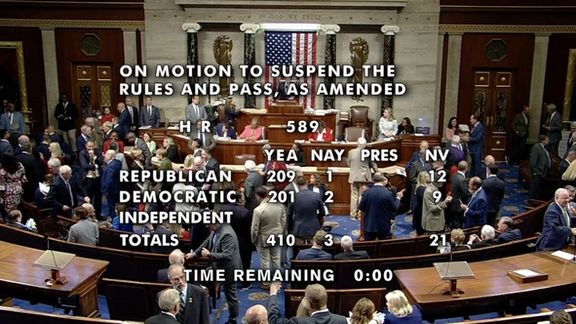
The US House of Representatives has voted 410-3 for a bill that hardens the sanctions against the Supreme Leader and the President of the Islamic Republic of Iran.
The Mahsa Amini Human Rights and Security Accountability Act (MAHSA) requires the President to report to Congress every year whether those officials should remain under current sanctions.
Ali Khamenei and Ebrahim Raisi were first sanctioned by President Donald Trump by an executive order in 2019. The Mahsa Act would make it much more difficult to lift those sanctions for the current and future administrations.
The resolution will have to pass the Senate to become law. The Senate is controlled by Democrats, who may not be as eager as the majority Republicans in the lower chamber to consider the bill.
The Mahsa Act was first introduced in January 2023, a few months after Mahsa Amini, a 22-year-old woman, was killed in hijab police custody in Tehran, triggering months of widespread protest which challenged the Islamic Republic like never before.
Referring to the regime’s human rights abuses following the protests, Rep Michael McCaul, the Chairman of House Committee on Foreign Affairs, called out the international community for “failing to compel” the oppressors of the Iranian people “to stop this abuse”.
“We have many sanction laws designed to address Iran’s regime’s human rights violations,” McCaul said, “however, it is clear that many officials and institutions in Iran have not yet been sanctioned for their role in these abuses.”
McCaul also attacked the Biden administration for its “political agenda” in dealing with Iran’s government and said: “We must not sell off the Iranian people to reach a bad nuclear deal.”
Young Iranian American activists who had worked hard for months to ensure support for MAHSA Act were jubilant on social media, and more confident about advocating a tougher US stance toward the Islamic Republic.
The rift between the House and the Biden administration over Iran policy has become clearer in recent weeks: first over Robert Malley, US Special Envoy on Iran, whose security clearance has been revoked and is currently the subject of a FBI investigation, and then the prisoner swap deal that would release $6 billion of Iran’s assets frozen in South Korea.
Secretary of State Antony Blinken has signed off a sanction waiver to allow international banks to transfer the funds. He had done so last week, AP reported, whereas the Congress was informed of the measure only on Monday (September 11).
Earlier on Tuesday, Senator Ted Cruz (R-TX) lambasted the US government for its secret deal with the Islamic Republic and said: “The Biden administration must keep their deal secret because if they disclosed it, the law requires them to come to Congress and defend it, and this appeasement is utterly indefensible.”
Jim Risch (R-ID), Ranking Member of the Senate Foreign Relations Committee, warned that the prisoner swap deal “creates dangerous incentives to capture Americans abroad”. He pointed out that striking such a deal “is tone deaf on the anniversary of Mahsa Amini death."
September 16 marks one year since the killing of Mahsa Amini.
The bill bearing her name was not the only Iran-related bill to pass the House on Tuesday. The Representatives also voted to target Iran’s production and exports of missiles and drones by sanctioning those involved in such programs. The last of the bills was specifically designed to condemn the Islamic Republic’s persecution of the Baha’i minority.
All three bills passed almost unanimously, indicating an increasingly united front against Iran’s rulers in the US House of Representatives.
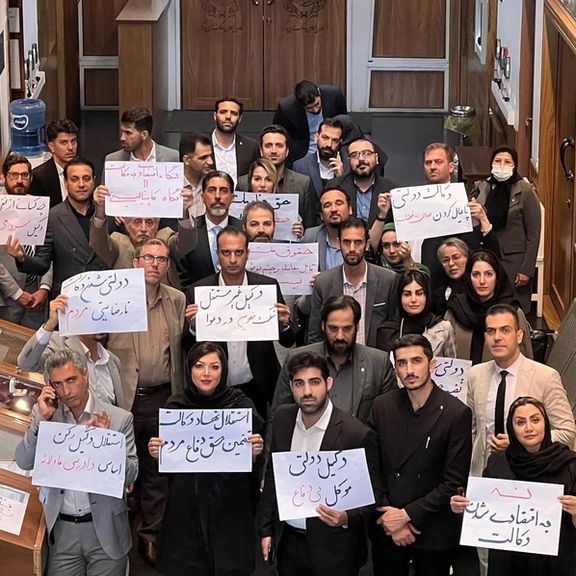
Dozens of lawyers in Iran held a demonstration on Tuesday to protest recent judicial reforms, which they say have raised significant challenges for human rights lawyers.
The lawyers, who had gathered outside the judiciary’s headquarters in Tehran, said the new reforms particularly hinder the lawyers who defend politically motivated cases including activists, dissidents, journalists, and artists targeted by the state.
The messages conveyed by their signs were unequivocal: "Lawyers' independence safeguards the defense of people's rights" and "Without independent lawyers, defendants are left defenseless."
Over time, Iranian bar associations have faced increasing pressures from governmental bodies and the judiciary. They have gradually seen their autonomy and authority erode through the enactment of various laws and a series of protests were seen at bar associations across the country in August.
On August 21, Iranian lawmakers passed a new bill that imposes a mandate on bar associations to comply with decisions made by the Regulatory Board of the Ministry of Economy, effectively rendering them as extensions of the government. The legislation restricts the possibility of challenging the decisions of the Regulatory Board in the Administrative Justice Court.
Among its provisions, the resolution confers authority upon the Ministry of Economy to issue, renew, and revoke attorney licenses. Lawyers contend that this move contradicts international legal standards and established regulations.
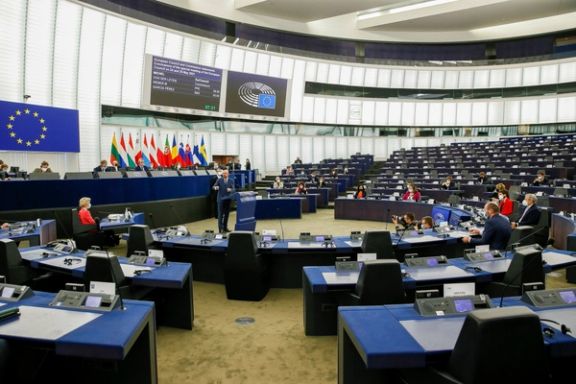
Members of the European Parliament Tuesday grilled EU’s foreign policy chief Josep Borrell over the bloc’s Iran policy as he tried to defend the trite strategies.
The plenary session opened in Strasbourg to discuss the effectiveness of European measures “one year after the murder of Mahsa Amini” in custody of the Islamic Republic’s hijab police that ignited the Women, Life, Freedom protests, the boldest revolt against the regime since its establishment in 1979.
Opening remarks by European Parliament President Roberta Metsola a day earlier sounded vapid as she reiterated that “Parliament proudly stands with the brave, defiant women and men who continue to fight for equality, dignity and freedom in Iran...” She also “strongly” condemned the Iranian regime for “taking EU and dual nationals hostage” and called for “the immediate release of EU official Johan Floderus and Professor Ahmad Reza Jalali.”
EU foreign policy chief Joseph Borrell opened similarly, claiming that "the EU has stood united over the past 12 months on Iran.” “The last 12 months marked a clear change in our relations with Iran. We've adopted nine consecutive rounds of sanctions...Our relations with Iran are at a low point, but we need to keep diplomatic channels open."
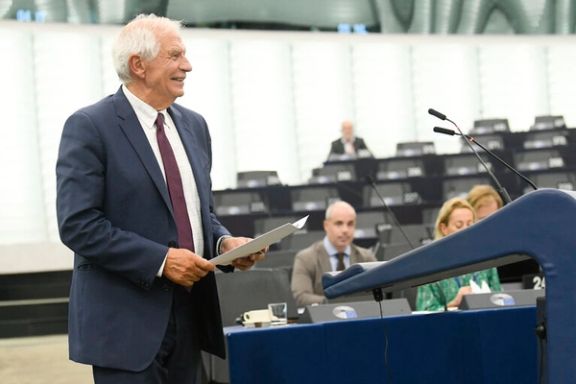
After Borrell, dozens of MEPs took turns decrying what they dubbed as toothless measures against the regime that failed to prevent killing of protesters, taking hostages, supplying arms to Russia and wreaking havoc across the region through the Revolutionary Guards as well as its proxy militias. Their demands included labeling the IRGC as a terrorist outfit, more comprehensive sanctions against the regime's human rights abusers, and refusing any negotiations with the regime until all EU citizens unjustly held are freed.
German MEP Hannah Neumann said, "Mr. Borrell, it's time to clearly spell it out: The EU's Iran policy of the last 44 years has failed. Stop meeting regime representatives! Start meeting the many different people that advocate for a free Iran! Stop financial flows of the regime and start exploring avenues for the diaspora to send home remittances for strike funds!”
“Spell out the truth: This regime terrorizes its own citizens and the whole region, it systematically uses rape to force political prisoners into confessions, and it is already preparing to crack down on the protests planned for September 16 (the death anniversary of Mahsa Amini). Mr. Borrell, you have to stop stabilizing a brutal regime while the people in Iran are prepared to die for its downfall!" she added.
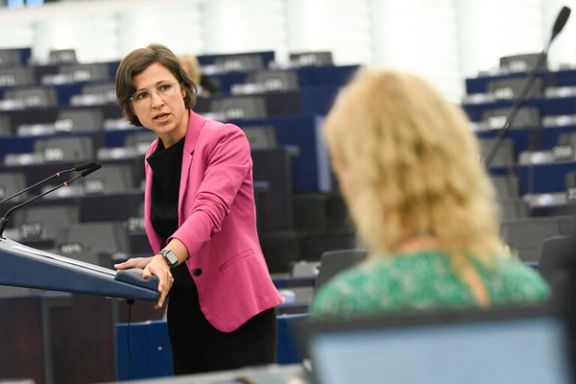
Guy Verhofstadt, a former Belgian prime minister, denounced EU’s approach and strategy on the Islamic Republic, saying, “Let's be honest: the policy and the strategy of Europe towards Iran is purely symbolic. It has nothing to do with stopping the regime.”
“This parliament wants another approach! I request that in two months, we revisit this matter on the plenary of this parliament so that we can see the change in your strategy and that you can also convince your colleagues, the ministers of foreign affairs, because a new course of action is not solely your responsibility,” he added.
“What is happening in Iran is a disgrace. It's a regime of violence and murder,"Verhofstadt underlined.
Charlie Weimers, a Swedish conservative democrat, noted that “EU leaders have expressed support for the protests against the mullahs. But the EU has continued its failed policy of appeasement.”
He called on all the decision makers to “unite -- from left to right -- for a new EU policy: Maximum support for the people. Maximum pressure on the regime.”
Bart Groothuis, a Dutch MEP, called on the bloc to “expel all Iranian ambassadors from Europe” and cut diplomatic ties “until all European hostages are freed."
Borrell, the High Representative for Foreign Affairs and Security Policy, took the floor again after the MEPs, saying, “I don't think it is acceptable to say that the European Union supports this regime, which is what I just heard... You've expressed your moral indignation, and that's okay, but I don't think that that is actually going to solve miraculously the problems.”
"We've been working to help support Iranian women in their fight for their fundamental rights and will continue to do so. We are also working with the member states to try and solve many of the cases of European citizens that have been illegally detained in Iran. And we're trying to help and provide support for them to come back to Europe,” he stated.
Regarding calls for the designation of IRGC as a terrorist group, Borrell reiterated his earlier position that a national authority or court should find the IRGC complicit in terrorism before the EU takes a step to designate it.
Borrell claimed that "At the moment, we don't have that, and well, I can't take this step. We need the unanimity of the 27 member states and that is the basis. So, I'm afraid I can't do this. If you think that I'm wrong, tell me why."
His remarks came despite numerous efforts by MEPs and activists to provide the necessary groundwork for the EU to act on calls to list the IRGC as a terror group. In July, two MEPs stated that according to the “Common Position 2001/931/CFSP, Article 1(4) which sets out the parameters for the inclusion of persons and entities on the EU terrorist list,” the IRGC can be listed without any legal barriers. In June, a similar line of arguments was put forth by Iran’s exiled prince Reza Pahlavi, citing a group of French-Iranian lawyers who reasoned that there are no legal obstacles for the EU to blacklist the Revolutionary Guards.
In January, the European Parliament overwhelmingly passed a resolution calling on the EU and member states to designate the IRGC as a terrorist group, as it does not have such an authority. If the resolution garners enough support, it is then upon the national governments of the EU member states to make the final decision. The listing of the IRGC must have a unanimous vote by all 27 EU members in the EU Council.






